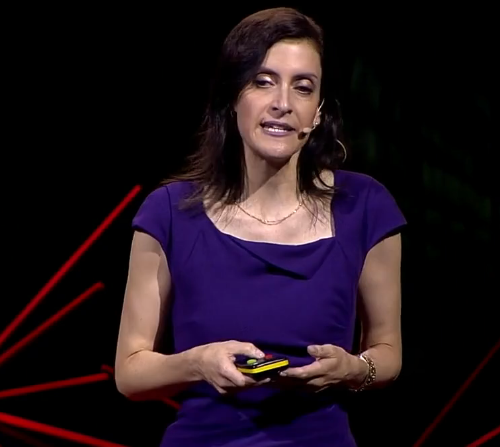(单词翻译:单击)
演讲文本
Later, Babbage's analytical engine was the first mechanical computer in the modern sense.
巴贝奇之后提出的分析机,是第一个现代意义上的机械计算机。
It had a separate memory and central processor.
该机有独立的中央处理器和内存。
It was capable of iteration, conditional branching and parallel processing,
它可以进行迭代、条件跳转,并且可以并行处理,
and it was programmable using punched cards, an idea Babbage took from Jacquard's loom.
可以使用穿孔卡进行编程,这是巴贝奇从雅卡尔的织布机中得到的灵感。
Tragically, Babbage's engines never were built in his day
很遗憾的是巴贝奇的分析机没能得以实际制造出来,
because most people thought that non-human computers would have no usefulness for the public.
因为大多数人认为,非人类的计算机对于公众利益而言没有什么好处。
Founded in Bacon's time, the Royal Society of London
培根时代建立的伦敦皇家学会
was the foremost scientific society in England and even in the rest of the world.
是英格兰,甚至是全世界最早的科学团体。

By the 19th century, it had become a kind of gentleman's club
在19世纪的时候,它变成了上层绅士们的俱乐部,
populated mainly by antiquarians, literary men and the nobility.
挤满了古文物学家、文学家和贵族。
The members of the philosophical breakfast club
哲学早餐俱乐部
helped form a number of new scientific societies, including the British Association.
帮助建立一系列的科学团体,包括英国进步科学协会在内。
These new societies required that members be active researchers publishing their results.
这些新的学会都要求他们的成员是活跃的研究人员,并有发表研究结果。
They reinstated the tradition of the Q and A after scientific papers were read,
他们恢复了针对学术论文的问答环节,
which had been discontinued by the Royal Society as being ungentlemanly.
这一传统当时已经不被伦敦皇家学会采用,理由是不够绅士。
And for the first time, they gave women a foot in the door of science.
同时,他们首次让女性有机会涉足科学。
Members were encouraged to bring their wives,
英国科学进步协会鼓励会员
daughters and sisters to the meetings of the British Association,
携带自己的妻子、女儿、姐妹参加会议,
and while the women were expected to attend only the public lectures and the social events like this one,
虽然当时只是允许女性参加一些公开报告和社交类的活动,
they began to infiltrate the scientific sessions as well.
但是女性由此开始逐渐参与到科学领域中。
视频及简介
演讲简介:
1812年,四位学者在在剑桥大学一起吃了一顿早餐。一次影响至今的科学革命就这样开始了。这四个人——在“科学家”一词出现之前自称“自然哲学家”——将四个基本原则引入科学领域。哲学家、历史学家劳拉·斯奈德(Laura Snyder)讲述了他们这段奇妙的故事。


